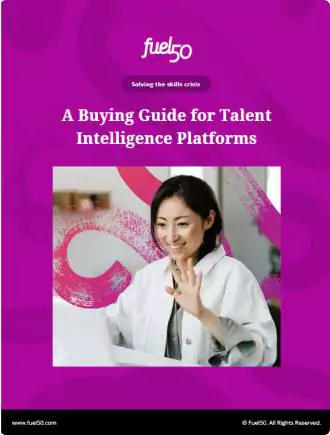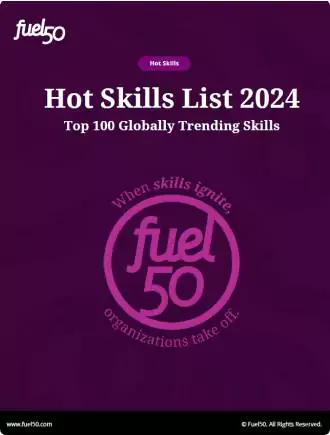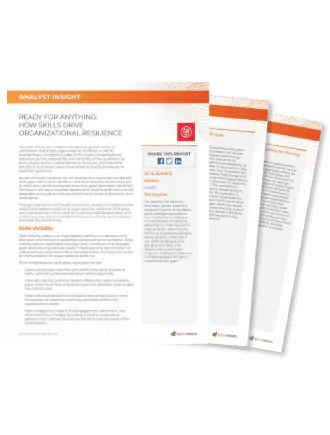When Kodak filed for bankruptcy in 2012, it wasn’t just because they failed to adapt to digital photography. It was because they failed to adapt their workforce.
Despite inventing the first digital camera, Kodak couldn’t shift its employees’ skills from film to digital fast enough. The result? A once-dominant company became a cautionary tale.
This story underscores a critical truth for today’s businesses: your workforce’s skills can make or break your company.
And that is where the workplace skills plan comes into play: To help companies have a strategic roadmap for ensuring your workforce can meet tomorrow’s challenges.
In this article, we’ll dive into what workplace skills plans are, why you need one, and how to create an effective plan that keeps your organization ahead of the curve.
Note: Ready to transform into a skills-based organization? Fuel50’s talent marketplace can help you map your skills landscape, develop targeted learning paths, and create a more agile, future-ready workforce. Request a demo today.
What is a workplace skills plan?
A workplace skills plan (WSP) is a strategic document that outlines an organization’s approach to developing and maintaining the skills of its workforce. It serves as a roadmap for identifying, addressing, and closing skills gaps within the company to ensure that employees have the necessary competencies to perform their roles effectively and contribute to the organization’s overall objectives.
At its core, a WSP is a comprehensive analysis of the current skills landscape within an organization, paired with a forward-looking strategy to enhance those skills. It typically covers a specific period, often annually, and is designed to align with the company’s broader business goals and objectives.
The purpose of a WSP is multifaceted. It aims to:
-
Enhance employee performance and productivity
-
Improve organizational efficiency and competitiveness
-
Ensure compliance with industry standards and regulations
-
Support career development and employee retention
-
Facilitate succession planning within the organization
In certain countries like South Africa, there are even regulations about workplace skills planning. They, for instance, have a Skills Development Act that mandates that organizations with 50 or more employees establish a training committee for effective skills planning. This act emphasizes the importance of broad stakeholder consultation and adequate resources for implementing skills development and training strategies.
Key stakeholders involved in developing and implementing a workplace skill plan typically include:
-
Human Resources department
-
Senior management
-
Department heads or team leaders
-
Employees at various levels
-
Training and development specialists
-
Skills development facilitator (SDF)
-
External consultants or training providers (when applicable)
The skills development facilitator (SDF) plays a crucial role in managing training needs, compiling the WSP, and ensuring compliance with skills development regulations.
By creating a structured approach to skills development, a workplace skills plan helps organizations stay agile, competitive, and prepared for future challenges in an ever-evolving business landscape.
Workforce skills vs. workplace skills
While often used interchangeably, workforce skills and workplace skills have distinct meanings and implications for organizations.
What’s the difference between workforce skills and workplace skills?
Workforce skills refer to the broad set of competencies that individuals possess or need to succeed in the job market across various industries and roles. These are often transferable skills that remain valuable regardless of the specific workplace or position.
Key characteristics of workforce skills:
- Broadly applicable across industries
- Often transferable between different roles
- Reflect overall employability
- Tend to evolve with broader economic and technological trends
Examples of workforce skills:
-
Communication
-
Problem-solving
-
Adaptability
-
Digital literacy
-
Leadership
-
Critical thinking
-
Teamwork
-
Time management
On the other hand, workplace skills are the specific abilities and knowledge required to perform effectively in a particular job role or within a specific organizational context. These skills are often more technical or job-specific in nature.
Key characteristics of workplace skills:
- Specific to a particular job or industry
- Often require specialized training or education
- May be unique to a particular organization or work environment
- Can change rapidly with technological advancements or industry shifts
Examples of workplace skills:
-
Proficiency in specific software or tools
-
Knowledge of company-specific processes
-
Familiarity with industry regulations
-
Technical skills related to specific machinery or equipment
-
Understanding of organizational protocols and procedures
Relationship to workplace skills plan:
When developing a workplace skills plan, it’s essential to consider both workforce and workplace skills:
- Workforce skills form the foundation of an employee’s overall capability and adaptability. They should be nurtured to ensure long-term employability and organizational flexibility.
- Workplace skills are crucial for immediate job performance and organizational efficiency. They often form the core of role-specific training and development initiatives.
- A comprehensive workplace skills plan should aim to balance the development of both types of skills, ensuring employees are both proficient in their current roles and prepared for future career growth.
- The plan should account for the evolving nature of both skill sets, particularly as industries undergo digital transformation and other significant changes.
- Assessment of workforce skills can help identify potential for internal mobility and career development, while evaluation of workplace skills can pinpoint immediate training needs.
Why does your organization need a workplace skills plan?
The primary driver behind the need for a workplace skills plan is the ever-widening skills gap. According to the World Economic Forum’s Future of Jobs Report 2020, a staggering 50% of all employees will need reskilling by 2025 due to the adoption of new technologies.
This statistic underscores the urgency for organizations to take proactive measures in developing their workforce.
Take AT&T, for example. Recognizing the seismic shifts in the telecommunications industry, the company launched its massive reskilling program, Future Ready, in 2013. With an investment of $1 billion, AT&T has since retrained more than 100,000 employees.

The results speak volumes: 40% of the company’s technology management jobs were filled by internal candidates, showcasing how a robust skills plan can not only bridge skills gaps but also significantly reduce hiring and onboarding costs.
Skills development interventions play a crucial role in addressing identified skills gaps by providing targeted training and development strategies.
Here are more reasons why your organization needs a workplace skills plan.
Keeping good people around
Let’s imagine you’ve just spent months training a star employee, Sarah, on a new software system. She’s become the go-to person for troubleshooting. Then, out of the blue, she hands in her resignation. Why? “I don’t see a future for myself here,” she says.
This scenario plays out in companies every day. It’s frustrating, costly, and completely avoidable with a solid workplace skills plan.
A skills plan doesn’t just train people for their current job. It maps out potential career paths within the company and provides the training to get there. For Sarah, this might mean seeing a clear path from her current IT support role to a future as a project manager or systems architect.
This approach works. LinkedIn found that 94% of employees would stay longer at a company that invests in their career development. But it’s not just about retention numbers – it’s about building a culture of growth.
Amazon’s “Upskilling 2025” program shows how this can work on a large scale. They’re investing $700 million to retrain 100,000 U.S. employees by 2025. The program isn’t just about teaching new tech skills; it’s designed to show employees a future within the company.
For example, Amazon’s “Machine Learning University” isn’t just for current data scientists. It’s open to any employee with a tech background who wants to move into this high-demand field. A warehouse worker with a knack for coding could see a path to becoming a machine learning specialist without leaving the company.
This approach solves multiple problems at once. Employees like Sarah see a future with the company and stay engaged. Amazon fills critical roles internally, saving on recruitment costs. And the company builds a reputation as a great place to grow, attracting even more talent.
A workplace skills plan turns “dead-end” jobs into launching pads for exciting careers. It transforms the “I don’t see a future here” conversation into “I can’t wait to see where I’ll be in five years.”
Growing future leaders
Now imagine this.
Your company’s star VP of Marketing, John, just announced he’s retiring next year. He’s been with the company for 20 years and knows the ins and outs of your industry like no one else. The board is in a panic. Who could possibly fill his shoes?
This is where a workplace skills plan proves its worth. Instead of scrambling to headhunt an expensive external hire, you could have a pool of internal candidates ready to step up.
A good skills plan doesn’t just focus on immediate needs. It looks ahead, identifying potential leaders and giving them the skills they’ll need years before they take the reins. It’s like planting seeds for trees you’ll need shade from in the future.
For John’s replacement, this might mean identifying promising marketing managers years ago. Your skills plan would have ensured they received training not just in marketing, but in leadership, strategy, and the broader business landscape.
General Electric (GE) has mastered this approach. Their leadership development program is so effective that “GE leadership tree” has become a term in the business world. Other companies often poach GE executives because they know these leaders come with a rich, diverse skill set.
Here’s how GE does it: They rotate promising employees through different roles and departments. A finance whiz might spend time in operations, then marketing, then international assignments. Along the way, they’re given increasing responsibilities and continuous training.
This approach solves multiple challenges:
- It prevents the panic when a key leader leaves.
- It saves millions in executive search and signing bonuses for external hires.
- It boosts morale by showing employees they can rise to the top.
- It ensures new leaders understand the company inside and out.
A workplace skills plan turns leadership development from a reactive scramble into a proactive, ongoing process. It transforms the “Who could replace John?” crisis into a “We have three great candidates ready to step up” opportunity.
Remember, every senior leader in your company will retire someday. A skills plan ensures that day is an orderly transition, not a fire drill.
Boosting productivity and profits
Many companies view training as a necessary expense, but a well-crafted workplace skills plan can actually be a powerful profit driver. Here’s how:
When employees have the right skills, they work smarter, not just harder. They solve problems faster, make fewer mistakes, and come up with innovative ideas. All of this translates directly to the bottom line.
Let’s look at the numbers: A study by the National Center on the Educational Quality of the Workforce found that a 10% increase in workforce education level led to an 8.6% gain in total productivity. That’s a significant return on investment for any training program.
But it’s not just about productivity. Skilled, engaged employees have a direct impact on profitability. Gallup’s research shows that businesses with highly engaged employees are 23% more profitable than those with low engagement.
A workplace skills plan addresses both these factors. It not only upskills employees but also boosts engagement by showing them the company is invested in their growth.
Take Motorola as an example. In the early 1990s, they calculated that every dollar invested in training yielded $30 in productivity gains within three years. This wasn’t just a happy accident. It was the result of a carefully planned and executed skills development strategy.
Here’s what Motorola did right:
- They aligned their training with specific business goals.
- They made learning accessible, offering a mix of classroom and on-the-job training.
- They measured the impact of training on performance metrics.
- They created a culture where continuous learning was expected and rewarded.
The result wasn’t just improved skills, but a workforce that was more adaptable, innovative, and committed to the company’s success.
A workplace skills plan, when done right, isn’t a cost center—it’s a profit generator. It transforms training from a box-ticking exercise into a strategic tool for business growth. In today’s competitive market, can you afford not to have one?
Key components of a workplace skills plan
A workplace skills plan is more than just a document; it’s a living strategy that evolves with your organization. Let’s break down its key components and see how they work together to create a robust framework for employee development and organizational success.
Skills assessment and gap analysis
At the heart of any effective workplace skills plan is a thorough understanding of where your organization stands. This component involves taking stock of your current workforce’s skills and comparing them to what you’ll need in the future.
Imagine you’re running a marketing agency. Your team excels at traditional advertising, but you’ve noticed a shift towards digital marketing among your clients. A skills assessment might reveal that while your team is strong in areas like brand strategy and copywriting, they’re lacking in skills like SEO, social media marketing, and data analytics.
This gap analysis becomes the foundation of your entire plan. It highlights the occupational shortages and skills gaps identified by employers, which are crucial for developing a well-structured Workplace Skills Plan (WSP). The WSP outlines the necessary training programs to bridge these gaps, ensuring that your training efforts are focused and resources are prioritized effectively. Without this step, you’re essentially flying blind, potentially wasting time and money on unnecessary training while critical skill gaps remain unfilled.
Training and development programs
Once you’ve identified your skill gaps, the next step is to create targeted skills development programmes. This isn’t about sending everyone to the same generic workshop. Instead, it’s about crafting tailored learning experiences that address specific needs and align with your organization’s overall development strategy.
Continuing with our marketing agency example, you might set up a series of workshops on digital marketing techniques, bring in experts for hands-on SEO training, or enroll key team members in advanced analytics courses. The key is to align these programs closely with the gaps you’ve identified and the skills your organization needs to thrive. Drafting a Workplace Skills Plan (WSP) can be essential in ensuring that these training initiatives are responsive to skill gaps and contribute to the overall effectiveness of the workplace.
But training isn’t just about formal courses. It could include mentoring programs, job rotations, or project-based learning opportunities. For instance, you might pair your traditional marketers with digital specialists on real client projects, allowing them to learn on the job.
This component is crucial because it’s where the rubber meets the road. It’s how you actually start closing those skill gaps and building the capabilities your organization needs.
Implementation timeline and budget
A plan without a timeline is just a wish list. That’s why a clear implementation schedule is crucial. This component lays out when each training initiative will take place, who will participate, and how long it will take.
In our marketing agency, you might decide to roll out basic digital marketing training to all staff over the first quarter, followed by specialized courses for different teams in the subsequent months. You’d also need to factor in busy periods for your agency when training might need to take a back seat.
A comprehensive training plan, as part of a Workplace Skills Plan (WSP), is essential. This plan identifies occupational shortages, skills gaps, and specifies which training programs and staff will be targeted to address these issues. Alongside the timeline, a realistic budget is essential. Training and development can be expensive, but remember, it’s an investment in your organization’s future. Your budget should cover not just the direct costs of courses or trainers, but also factors like employee time away from billable work.
This component keeps your plan grounded in reality. It ensures you’re not overreaching and that your skills development efforts are sustainable over the long term.
Evaluation and feedback mechanisms
The final key component is a system for measuring the effectiveness of your skills plan. This isn’t just about tallying up how many people attended a training session. It’s about assessing whether the training is actually improving performance and contributing to your organizational goals.
An essential part of this evaluation process is the Annual Training Report (ATR). In conjunction with the Workplace Skills Plan (WSP), the ATR allows organizations to report on their training activities and progress. This reporting is crucial for accountability and improvement in addressing prioritized skills needs.
In our marketing agency, this might involve tracking metrics like the number of digital projects successfully completed, client satisfaction scores, or even the agency’s ability to win pitches for digital marketing work.
But don’t forget the human element. Regular check-ins with employees can provide valuable insights into how they’re applying their new skills and where they might need additional support.
This component closes the loop, feeding back into your skills assessment and helping you refine your plan over time. It ensures your workplace skills plan remains relevant and effective, adapting as your organization’s needs evolve.
By weaving these components together, you create a workplace skills plan that’s more than the sum of its parts. It becomes a dynamic tool for driving your organization forward, ensuring you have the right skills in the right place at the right time.
Note: Ready to transform into a skills-based organization? Fuel50’s talent marketplace can help you map your skills landscape, develop targeted learning paths, and create a more agile, future-ready workforce. Request a demo today.
How to create an effective workplace skills plan
Creating a workplace skills plan isn’t a one-size-fits-all process, but there are key steps that can guide you toward developing a robust and effective strategy. Let’s walk through these steps, understanding their importance and how they contribute to the overall success of your plan.
Align with organizational goals
The first step in creating an effective workplace skills plan is to align it with your organization’s broader goals and strategy. This alignment ensures that your skills development efforts directly contribute to your company’s success.
Start by sitting down with key stakeholders across your organization. If you’re a manufacturing company aiming to adopt more sustainable practices, for instance, your skills plan should reflect this.
You might need to develop expertise in green technologies, sustainable supply chain management, or environmental compliance.
This alignment is crucial because it gives your skills plan purpose and direction. It helps you prioritize which skills to develop and ensures that your training efforts directly support your company’s strategic objectives.
Without this alignment, you risk investing time and resources into developing skills that, while potentially interesting, don’t move your organization forward.
Conduct a comprehensive skills audit
Once you’ve aligned your plan with organizational goals, the next step is to take stock of your current skills landscape. This involves conducting a thorough skills audit across your workforce.
In practice, this might involve a combination of methods. You could use self-assessment surveys where employees rate their proficiency in various skills. You might also incorporate manager evaluations, performance data, and even practical skills tests.
Let’s say you’re a tech company planning to expand into artificial intelligence. Your skills audit might reveal that while you have strong software development skills, you’re lacking in specific AI competencies like machine learning algorithms or neural network design.
This step is vital because it gives you a clear picture of your starting point. It highlights your organization’s strengths and weaknesses, allowing you to identify skill gaps that need to be addressed. Without this baseline, you’d be planning in the dark, potentially missing critical skill shortages or wasting resources on unnecessary training.
Identify future skill needs
With a clear understanding of your current skills, the next step is to look ahead and identify the skills your organization will need in the future. This involves analyzing industry trends, technological developments, and your own strategic plans.
For a financial services company, this might involve recognizing the growing importance of skills in areas like blockchain technology, data privacy, or sustainable finance. You’d need to consider not just the technical skills required but also the soft skills that will be crucial in a rapidly changing industry.
This forward-looking approach is essential because it allows you to be proactive rather than reactive in your skills development. It helps you stay ahead of the curve, preparing your workforce for future challenges and opportunities before they arise.
Without this foresight, you risk falling behind competitors or scrambling to develop critical skills when it’s already too late.
Prioritize skill gaps
Once you’ve identified both your current skills and future needs, the next step is to prioritize which skill gaps to address first. Not all skill gaps are created equal, and you likely won’t have the resources to tackle everything at once.
This prioritization should consider factors like the urgency of the need, the potential impact on your business, and the resources required to develop each skill. In the context of a Workplace Skills Plan (WSP), having your priority skills defined is essential. This reporting is crucial for accessing mandatory grants for skills training, as it highlights how your organization addresses specific skill priorities outlined in your plan. You might use a matrix that plots the importance of each skill against the current skill level in your organization.
For example, if you’re a retail company moving towards an omnichannel strategy, you might prioritize skills in areas like digital marketing, data analytics, and customer experience design over other less critical gaps.
This step is crucial because it helps you focus your efforts and resources where they’ll have the most significant impact. It ensures that your skills plan addresses the most pressing needs first, maximizing its effectiveness and return on investment.
Design targeted learning interventions
With your priorities set, the next step is to design learning interventions that will effectively close your identified skill gaps. This is where skills training comes into play, particularly within the framework of a Workplace Skills Plan (WSP).
Remember, effective learning isn’t one-size-fits-all. For a software development company aiming to upskill in cloud computing, this might involve a combination of online courses, hands-on projects, peer mentoring, and attendance at industry conferences. The key is to match the learning method to the skill being developed and the learners themselves.
This step is crucial because it’s where your plan starts to take tangible form. Well-designed learning interventions ensure that your employees are not just exposed to new information, but actually develop practical, applicable skills. Without careful design, you risk ending up with training that looks good on paper but fails to deliver real-world results.
Develop an implementation plan
With your learning interventions designed, the next step is to create a detailed implementation plan. This should outline who will participate in which training, when it will occur, and how it will be delivered.
For instance, if you’re a healthcare provider implementing a new electronic health record system, your plan might involve a phased approach. You could start with IT staff training, followed by clinician super-users, and then roll out to the broader staff. Your plan should also account for factors like shift schedules and patient care demands.
This step is vital because it transforms your skills plan from a concept into an actionable roadmap. It helps ensure that your training efforts are coordinated, efficient, and minimally disruptive to your regular operations. Without a solid implementation plan, even the best-designed learning interventions can fall flat due to poor execution.
Allocate resources
With your implementation plan in place, you need to ensure you have the resources to make it happen. This involves not just financial budgeting, but also allocating time, personnel, and technological resources.
For example, if you’re a manufacturing company investing in robotics training, you’ll need to budget not just for the training itself, but potentially for equipment, software licenses, and the time employees will spend away from their regular duties. You might also need to bring in external trainers or send key staff to specialized courses.
This step is crucial because it ensures your skills plan is realistic and achievable. Without proper resource allocation, including the effective use of skills development levies, you risk having a great plan on paper that you can’t actually execute, leading to frustration and wasted effort.
Establish monitoring and evaluation mechanisms
The final step in creating your workplace skills plan is to establish how you’ll monitor its progress and evaluate its effectiveness. This involves setting up systems to track participation in training, measure skill development, and assess the impact on job performance and business outcomes.
For a sales organization, this might involve tracking metrics like completion rates for sales training modules, improvements in key sales metrics, and feedback from both sales staff and customers. You might also conduct regular skills assessments to measure progress in closing identified gaps.
This step is essential because it allows you to gauge the success of your plan and make data-driven adjustments as needed. It helps you demonstrate the ROI of your skills development efforts and provides insights for continual improvement. Without robust monitoring and evaluation, you’re essentially flying blind, unable to tell if your skills plan is actually delivering the intended results.
Turn your organization into a skills-based organization by leveraging Fuel50
Fuel50’s comprehensive talent marketplace platform offers several features that significantly support and enhance your transition to a skills-based model.
Here’s how Fuel50 can help you become a skills-based organization:
Create a dynamic skills inventory
Fuel50’s expert-driven skills ontology goes beyond traditional skills tracking methods. It creates a detailed map of skills across your organization, allowing you to identify and categorize skills based on actual capabilities rather than just job titles or roles.

The platform’s expert-powered skills mapping tools enable you to visualize the skills landscape within your organization, helping you spot skill clusters, gaps, and emerging trends. This approach ensures you have a real-time, accurate picture of your organization’s skill base.
By combining skills mapping with career aspirations, Fuel50 helps you create a more nuanced and forward-looking view of your talent pool, essential for a skills-based approach.
Align skills with business objectives
One of the challenges in becoming a skills-based organization is ensuring that your skills inventory aligns with your strategic goals. Effective workplace skills planning is crucial in this context, as it involves addressing skills development and training needs while engaging stakeholders to ensure adequate resources and support for the process. Fuel50 addresses this by providing comprehensive skills gap analysis against your organization’s objectives.

The platform compares the current skills of your workforce against the skills required to meet your business goals, highlighting areas where development or acquisition is needed.
This visibility allows you to create targeted strategies for skill development and acquisition. Instead of generic training programs, you can focus on developing the specific skills that will drive your organization forward.
Foster a culture of continuous skill development
Fuel50’s personalized learning and development recommendations transform skill development from a periodic event to an ongoing process. The platform offers tailored suggestions for courses, resources, and experiences that align with both the employee’s career goals and your organization’s skill needs.

Moreover, the platform’s gig marketplace feature allows employees to take on short-term projects or assignments that develop new skills or apply existing ones in different contexts.
This experiential learning is crucial for developing a versatile, multi-skilled workforce that can adapt to changing business needs. By integrating learning so closely with skills development, Fuel50 helps create a culture where employees are constantly expanding their skill sets.
Enhance retention through skill-based career pathing
A skills-based approach isn’t just about organizational efficiency; it’s about providing clear growth opportunities for employees. Fuel50’s focus on skill-based career pathing plays a crucial role in keeping your employees engaged and committed to your organization.

The platform’s transparency about skill requirements for various roles and development paths gives employees a clear vision of how they can grow within your company based on their skills and interests.
Furthermore, Fuel50’s mentoring features facilitate skill transfer between employees. These relationships not only aid in knowledge sharing but also help employees feel valued and invested in, increasing their likelihood of developing new skills and seeking growth opportunities within your organization.
Provide data-driven insights for strategic workforce planning
Effective skills-based management requires a deep understanding of your current skills landscape and future needs. Fuel50’s analytics capabilities provide valuable insights that can inform your skills strategy.

The platform can help you identify trends in skill development, track the progress of skill acquisition across the organization, and even predict future skill needs based on your organization’s direction and market trends.
These insights allow you to take a more proactive approach to skills management. Instead of simply reacting to skill gaps as they occur, you can strategically develop your skills pipeline to meet future needs across all departments.
This data-driven approach ensures your skills development efforts align closely with your overall business strategy, creating a more resilient and adaptable organization.
Note: Ready to transform into a skills-based organization? Fuel50’s talent marketplace can help you map your skills landscape, develop targeted learning paths, and create a more agile, future-ready workforce. Request a demo today.












